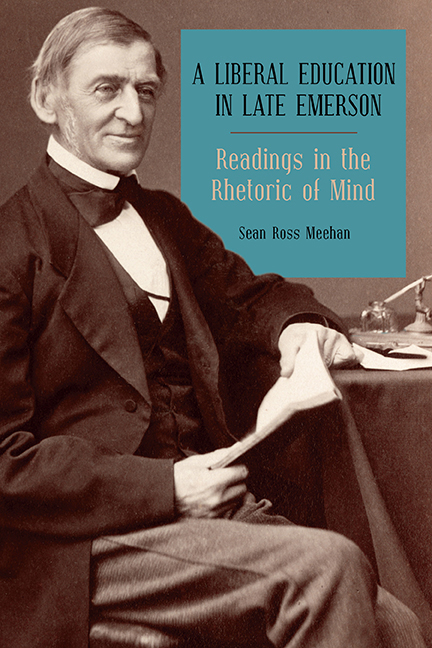Book contents
- Frontmatter
- Dedication
- Epigraph
- Contents
- Acknowledgments
- Introduction: Late Emerson and the Recomposition of Liberal Education
- 1 “Natural Method of Mental Philosophy”: William James's Principles of Pedagogy
- 2 “Education”: Charles W. Eliot's Invention of the University
- 3 “Poetry and Imagination”: Rhetorical Exercises in Walt Whitman's Gymnasium
- 4 “Eloquence”: Lessons in Emerson's Rhetoric of Metonymy
- Conclusion: Du Bois and the Double Consciousness of the College
- Notes
- Bibliography
- Index
1 - “Natural Method of Mental Philosophy”: William James's Principles of Pedagogy
Published online by Cambridge University Press: 13 April 2019
- Frontmatter
- Dedication
- Epigraph
- Contents
- Acknowledgments
- Introduction: Late Emerson and the Recomposition of Liberal Education
- 1 “Natural Method of Mental Philosophy”: William James's Principles of Pedagogy
- 2 “Education”: Charles W. Eliot's Invention of the University
- 3 “Poetry and Imagination”: Rhetorical Exercises in Walt Whitman's Gymnasium
- 4 “Eloquence”: Lessons in Emerson's Rhetoric of Metonymy
- Conclusion: Du Bois and the Double Consciousness of the College
- Notes
- Bibliography
- Index
Summary
“Rhetoric of Thought”
CONVENTIONAL WISDOM CONCERNING the intellectual relation between Emerson and William James, arguably Emerson's greatest philosophical progeny, has tended to follow a path of invidious comparison. As John Dewey, writing in an address delivered during the Emerson centenary celebrations in 1903, characterized the problem with regard to Emerson's disciplinary reception: “Literary critics admit his philosophy and deny his literature. And if philosophers extol his keen, calm art and speak with some depreciation, it also is perhaps because Emerson knew something deeper than our conventional definitions.”
In more recent decades, critics in both philosophy and literary studies, rather than depreciating Emerson or James with the feint praise of the other's discipline, have insightfully demonstrated the ways that Emerson's literary and poetic transgressions of philosophical conventions relate to James's own considerable example of intellectual boundary crossing. Douglas R. Anderson, to cite one example of this more sympathetic, cross-disciplinary reading of Emerson and James, argues that “Emerson's insistence on the poetic dimension of philosophy thus makes him a key figure” of influence for James, Dewey, and others in the school of “philosophy Americana,” “where the borders among ‘disciplines’ are found to be, in a Peircean way, more indefinite and more fluid.”
That fluidity is certainly what literary critics such as Richard Poirier, Joan Richardson, and others have had in mind when reading varieties of James's pragmatism and radical empiricism in Emerson's style of analogical thinking. Richardson argues persuasively that James's philosophical interests in the “space of mind” and his psychological understanding of intellectual processes were informed by “Emerson's insight into the scaling continuity of matter and spirit.” James himself identifies the psychological significance of Emerson's artistry and the poetics of his “expression” in his address delivered at the Emerson centenary in Concord in 1903. Emerson's project, James understands, unfolded a philosophy of “perception” that “culminated in his style,” and this despite the “phantom” of Emerson as an “ideal wraith” then hovering over Concord. As Dewey frames this Emersonian relation of mind and verbal medium by way of a quotation from Emerson: “‘I think that philosophy is still rude and elementary; it will one day be taught by poets.’”
- Type
- Chapter
- Information
- A Liberal Education in Late EmersonReadings in the Rhetoric of Mind, pp. 21 - 42Publisher: Boydell & BrewerPrint publication year: 2019



